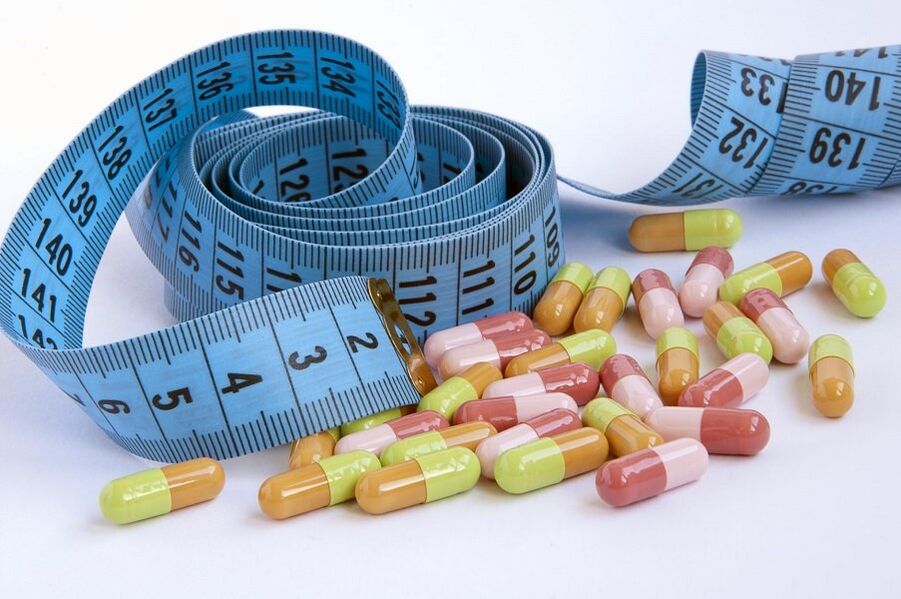Diet pills - especially diuretics - are perhaps one of the most tempting ways to say goodbye to being overweight. How good it would be to swallow a pill that someone had cleverly packed the active ingredients into and feel free to watch the limescale needle crawl down and the sides acquired in the winter melt! . . Too bad, in reality, everything is far from being so captivating.
The principle of action of diuretic diet pills
The old joke is that we are all cucumbers because we are 90% water. Laughter is laughter, and it’s partly true: 90 percent of our bodies, though 65 to 70 percent, are really fluid. And it’s not just the obvious blood, sweat and saliva! Every cell in the body contains water, without which it would not be able to exist, divide, and develop normally.
Occasionally, however, there is a failure of metabolic processes and too much water in the human body, and we get swellings, high blood pressure, and interruptions in the work of the heart, which receive an increased load during such periods. In this case, diuretics have been invented. OK:
- remove excess fluid from the tissues, helping it to convert to urine;
- blocks the kidney systems that are responsible for the reabsorption (reabsorption) of urine.
As a result, there is a sharp "outflow" of fluid from the body, which affects the balance reading. And sometimes very impressive!

And now about the inconvenience.Taking diuretics does not affect the body's fat reserves in any way, nor does it burn, break down or remove them.No matter how stunning a cord you repair, keep in mind that it’s just water that recovers quickly when you stop taking your pills.
However, we do not completely deny the benefits of diuretics in the fight against obesity.
- They have a cleansing effect, removing decomposition products from the body. And it has a beneficial effect on both health and human appearance.It is important not to overdo it here, because after removing the excess substances, the diuretics will absorb the necessary heat and leave you free of salts and minerals (especially calcium).
- A diuretic can provide powerful psychological support to a dieting person: sometimes it is very helpful to see the extra pounds melt in front of your eyes.
But all of this will only work if the medication is caused by medical indications - edema, pressure - or prescribed by a doctor for prophylactic purposes. Support it with a simple diet and jogging in the park and the problem of being overweight will be resolved within days. However, doctors do not categorically recommend the use of diuretics solely to combat obesity. In this case, the harms of unauthorized use of the drug often outweigh its benefits.
Diuretics should not be taken as slimming tablets. These are drugs designed primarily to help those with urogenital, cardiovascular, and endocrine problems. And weight loss is just an original side effect.
Types of diuretics
There are two ways to remove excess fluid from the body: take an artificial medication or use a "natural" diuretic. The first option is more effective and the second is safer.
Medicines
Pharmacy diuretics can be divided into 3 main groups.
The first and the strongestloop narcotics, which are named because of their ability to act on the Gengle loop in the kidney. They relax vascular smooth muscle, speed up kidney blood flow, increase filtration, reduce interstitial fluid volume, and remove magnesium, potassium, chlorine, and sodium salts from the body. Loop narcotics work quickly, effectively, are used in peak situations, such as hypertensive crisis or pulmonary edema, and have the most extensive list of side effects.
Careful! These are the most powerful diuretics. Prescribing a loop diuretic without medical advice puts your health at risk.
Second group- tazidnye drugs - have a less pronounced effect. Their "attention" is on the kidney tubules, causing both salts and fluids to leave the body, but with less force. Tazidnye drugs are prescribed for edema, pressure, glaucoma.
Tazide diuretics are sometimes taken in combination with loop diuretics.
Third group, potassium-sparing diuretics, have the most gentle effect on the body and minimal contraindications. They reduce pressure, fight swelling, and at the same time prevent potassium loss.
Despite the mild effect, potassium-sparing medications will cause you a lot of problems if you choose to take them at random.
natural diuretic
Self-administration of certain medications always has undesirable consequences. But natural diuretics do not carry such a danger. Of course, they are very gentle compared to tablets, but they still have the desired effect and cause the kidneys to remove fluid from the body in an enhanced mode. What are these products?
Fruits, vegetables and berries
- It’s no secret why you shouldn’t eat watermelons at night - going to the toilet won’t end there. And all thanks to its juicy paste, which in our case is perfect for the role of a natural diuretic!True, it is also dangerous, as it contains a lot of glucose, so it is not worth delighting yourself with fragrant fruits either.Everything must be in moderation.
- But you can be more courageous with blueberries. Its sour juice not only has a diuretic but also an antibacterial effect, retains potassium in the body and heals the urinary tract.
- Lemon behaves similarly. Squeeze half a fruit into a glass of water for a drink that stimulates fluid excretion, lowers blood pressure and protects the urinary tract from infections.
- We already talked about cucumbers at the beginning of the article. This - the first - is full of water, so it keeps your kidneys awake. And the second - contains sulfur and silicon, which contribute to the removal of uric acid from the body.
- Juicy celery steamed with cucumber supplies fluid to the cells of our body and initiates water metabolism. Add it often to vitamin smoothies or crunch it on a fresh stalk as a snack.
- You must have heard of the laxative effect of beet salads. But few know it’s a good diuretic and a bunch of antioxidants too. Arm yourself with a file!
- Cabbage also retains its diuretic properties when added to soup. But it is better to eat raw: in this case, it also strengthens the heart and serves the stomach.
- No less useful and raw carrots. Diuretic effect - times; vision advantage - two; restoration of the intestinal microflora - three; ability to regulate carbohydrate metabolism - four; pantry nicotinic acid, which helps burn fat - five. . . You can list for a long time, but it’s better to just add carrot dishes to your menu and enjoy the delicious weight loss.

In addition to these products, melons, pumpkins, pears, strawberries, viburnum, blackberries, gooseberries, cranberries, lettuce, asparagus, eggplant, zucchini, spinach, onions and garlic have a mild diuretic effect.
Another advantage of fruits and vegetables over tablets is that while they wash out some beneficial substances from the body due to their diuretic effect, they amply compensate for the losses due to the high content of vitamins and minerals.
Herbs and spices
- Green tea has been serving people since ancient times as a source of youth and health, as well as a quality remedy for edema. Make sure the package with this precious drink is sure to find a place for you on the kitchen cabinet shelf. It is recommended to consume 1-3 cups of green tea a day.
- Ginger removes excess fluid and toxins. Use as follows: 1 tbsp. l. pour grated ginger root with 1 liter of boiling water, leave to cook in a thermos for 2-3 hours and soak the resulting infusion with the addition of honey and sometimes milk like traditional tea. However, the burning root irritates the mucous membranes, so use it very, very moderately - up to 1 tablespoon. l. gingerbread daily. The duration of the treatment depends on your well-being, but it is desirable that it does not exceed 2 weeks. And if you have problems with your digestive system, you better refuse to use spices altogether.
- Parsley stimulates urination, improves digestion and floods the body with antioxidants. It whitens teeth a bit and also refreshes the breath, so let’s add it to the food while cooking. Or do this: 1-2 tablespoons. l. chopped parsley, pour 500 ml of boiling water, allow to cook until completely cooled, strain and drink the broth during the day - 3/4 cup 20 minutes before eating. The duration of treatment is 2 weeks.
- Dill is known in folk medicine as a strong diuretic and diuretic. Cook the parsley in the same way as the parsley, or put this: 1 tsp. dill seeds pour 1 cup boiling water, cool and drink the resulting infusion, 2 tbsp. l. before each meal. The full course is 2 weeks.
- Nettle, like ginger, cleanses the body not only of excess fluid but also of harmful substances. It works best in equal parts with oregano and birch leaves. 3 art. l. collection, pour 500 ml of boiling water, leave for 1 hour and drink 4-5 portions during the day. The duration of treatment is from one week to 1-1, 5 months.

An invigorating morning drink, coffee literally dries out the body, removing fluid from it. If you are afraid of the pressure, try your usual. . . oatmeal. Strangely, it can also act as a mild diuretic. But salt, sugar and plenty of protein in food, on the contrary, do everything you can to ensure that you don’t lose a single drop of moisture as well. Limit your intake of these foods.
Dietary supplements are a kind of compromise between pharmacy and natural remedies. In fact, the creations of the pharmaceutical industry contain extracts of plant ingredients and are therefore less dangerous than other diuretics. This does not save you from having to read the instructions in detail!
Contraindications and side effects
There are several contraindications to diuretics that should be considered before buying at a pharmacy:
- dehydration;
- jump in blood pressure;
- decreased vision and hearing;
- dizziness and headache, tinnitus;
- weakness and in some cases loss of consciousness;
- dysfunction of the vestibular device responsible for the sense of balance;
- electrolyte depletion;
- skin rashes and increased sensitivity to sunlight;
- excretion of vitamins and minerals from the body;
- nausea, indigestion, loss of appetite;
- gout due to increased uric acid levels.

No one should take diuretics without consulting their doctor. But diabetics, those with tuberculosis, gout, kidney and liver patients need to be especially careful with them. Separate category for pregnant women. Pregnant women can treat diuretics strictly as prescribed by their doctor.
How to take diuretics at home to lose weight?
- The first and most important rule is to see a doctor. Only a professional can anticipate all the pitfalls of your decision and anticipate potential complications.And don’t forget to tell your doctor if you are taking any other medicines - this will determine their compatibility with diuretics.
- Drink clean water with 6-8 glasses a day. Otherwise there is a risk of dehydration.
- Eat as little salt and sugar as possible, which will retain fluid in your body. But don’t deny yourself the natural diuretics: fruits, vegetables and spices.
- Watch for weight fluctuations by getting on the scales every day - in the morning, at the same time, after going to the toilet.
- If you feel unwell, stop losing weight immediately with a diuretic and switch to an exercise diet.
User opinion

"I’ll tell you honestly: a few times when I had to hide in tight clothes on the eve of the holiday and let go of excess water from my body, I used the help of a dehydrator. But I was aware that this was a one-time action and I would not keep taking these pills. In general, dear girls, it is better not to use diuretics at all or very, very rarely!































